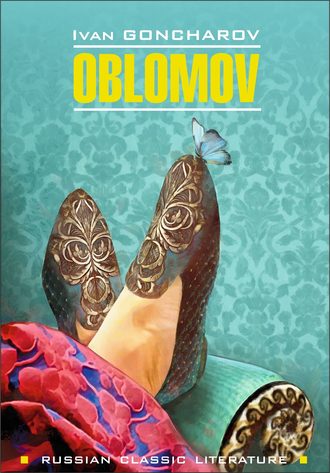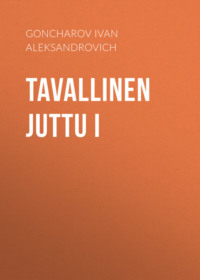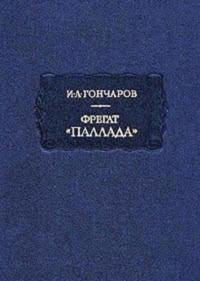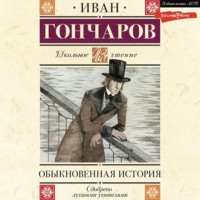
Полная версия
Oblomov / Обломов. Книга для чтения на английском языке
It was Mikhey Andreyich Tarantyev, a country neighbour of Oblomov.
Tarantyev looked at everything morosely, with ill-disguised contempt and open hostility towards the world at large; he was ready to abuse everyone and everything as though he had suffered some injustice or had been offended in his dignity, or like a man of strong character persecuted by destiny and submitting to it under protest and unwillingly. His gestures were bold and sweeping; he spoke in a loud voice, glibly and almost always angrily; listening to him from a distance one got the impression of three empty carts going over a bridge. He was never put out by anyone’s presence, was never at a loss for a word, and was generally rude to everyone, including his friends, as though making it clear that he bestowed a great honour on a person by talking to him or having dinner or supper at his place.
Tarantyev was a man of quick and cunning intelligence; no one could solve some practical question or some complicated legal problem better than he; he would at once devise his own theory of how it was best to act in the circumstances and would adduce very subtle arguments in favour of it, and in conclusion almost always be rude to the person who had asked his advice.
And yet, having obtained the job of a clerk in some government office twenty-five years before, he remained there in the same post till his hair began to turn grey. It never occurred to him or to anyone else that he might get higher up in the service.
The trouble was that Tarantyev was good only at talking; in words he settled everything simply and easily, especially where other people were concerned; but as soon as he had to move a finger or stir from his place – in short, apply his own theory in practice and show efficiency and expedition – he became an entirely different person; he was unable to rise to the occasion, he suddenly became dejected or unwell or awkward, or he found he had something else to do, which he did not do, either; or if he did, he made an unholy mess of it. He behaved just like a child: he overlooked something, or showed himself to be ignorant of the merest trifles, or was late for an appointment, or threw up the business half-way, or began at the wrong end and bungled it in such a way that it was quite impossible to put it right – and finally he would blame everybody but himself for his own incompetence.
His father, an old-fashioned provincial lawyer, had meant his son to inherit his skill and experience of looking after other people’s affairs and his professional ability at the Bar; but fate decided otherwise. The father, who was too poor to pay for a good education, did not want his son to lag behind the times and wished him to learn something besides the tricky business of legal practice. He sent him for three years to a priest to learn Latin.
The boy was gifted by nature, and in three years he mastered Latin grammar and syntax and had just begun to construe Cornelius Nepos when his father decided that he had already acquired enough knowledge to give him an enormous advantage over the older generation and that, indeed, any further studies might interfere with his practice in court.
Not knowing what to do with his Latin, the sixteen-year-old Mikhey began to forget it in his father’s house, but in the meantime, while waiting for the honour of attending the rural or the district court, he went to all his father’s merry parties, and in this school, amid the frank exchanges of opinions, the young man’s mind developed most thoroughly. He listened with the impressionability of youth to the stories told by his father and his cronies of various civil and criminal actions and of curious cases which passed through the hands of these old-fashioned lawyers. But all this led to nothing. Mikhey did not become a business man and a pettifogging lawyer in spite of his father’s efforts, which would of course have been successful had not fate ruined all his well-laid plans. Mikhey certainly mastered the whole theory on which his father’s talks were based; he had merely to put it into practice, but his father’s death prevented him from qualifying for the Bar and he was taken to Petersburg by some benefactor who found him a clerk’s job in a government office and then forgot all about him.
So Tarantyev remained a mere theoretician all his life. In his Petersburg office he had no use for Latin, or for his clever theory of twisting all cases, whether fairly or unfairly, as he liked; and yet he was conscious of a dormant force inside him, locked up through hostile circumstances without hope of ever breaking out, as the evil spirits in fairy-tales were deprived of their powers of doing harm by being imprisoned in enchanted dungeons. Quite likely it was this consciousness of the powers wasted within him which made Tarantyev so rude, malevolent, perpetually angry and abusive. He looked on his present occupation – the copying of papers, the filing of documents, etc. – with bitterness and contempt. He had only one last hope of improving his position in the distant future: to get a job in the spirit monopoly. This seemed to him the only profitable change from the occupation bequeathed to him by his father that he never succeeded in obtaining. And in expectation of this happy turn in his career, the ready-made theory of life and work created by his father, the theory of bribery and dishonest dealing, having failed to find its chief and worthy outlet in the provinces, was applied by him to all the trivial details of his paltry existence in Petersburg and, for lack of any official application, crept into his relations with his friends.
He was a bribe-taker at heart, on principle, and not having any official business with people, he contrived to take bribes from his colleagues and friends, goodness only knows for what services; he forced them either by bullying or cunning to entertain him whenever and wherever they could; he demanded to be treated with undeserved respect and constantly found fault with everybody. He was never ashamed of his threadbare clothes, but he could not help being worried if in the course of the day he could not look forward to an enormous dinner with a proper quantity of wines and spirits.
That was why among his friends he played the part of a big watchdog, which barks at everybody and allows no one to stir, but at the same time catches a piece of meat in the air, from whatever direction it may come.
Such were Oblomov’s two most assiduous visitors. Why did these two Russian proletarians come to him? They knew very well why: to eat, to drink, to smoke good cigars. They found a warm and comfortable place of refuge at his flat and met always with the same, if not cordial, then indifferent, reception.
But why did Oblomov let them come? That he could hardly tell himself. Quite possibly it was for the same reason that even to this day, in our remote Oblomovkas, every well-to-do house is crowded with the same sort of men and women, penniless, without a trade, with no abilities for any productive work, but with hungry mouths and almost always of some rank and standing.
There are still sybarites who need such accessories to life: they are bored without superfluous people. Who would hand them the snuff-box they had mislaid or pick up their handkerchief from the floor? To whom complain of their headache and from whom expect sympathy as a right, or tell a bad dream and demand an interpretation of it? Who would read a book to them at bedtime and help them go to sleep? And sometimes such a proletarian would be sent to the nearest town on an errand or put to help in the household – they could not be expected to bother with such tasks themselves, could they?
Tarantyev made a lot of noise and got Oblomov out of his immobility and boredom. He shouted, argued, and formed a sort of one-man show, making it unnecessary for his lazy host to speak or act. Into the room where sleep and peace reigned, Tarantyev brought life and movement and sometimes news from the outside world. Oblomov could listen and look, without lifting a finger, at something that was alive, moving and talking in front of him. Besides, he was still simple-minded enough to believe that Tarantyev could really give him some good piece of advice.
Oblomov put up with Alexeyev’s visits for another, no less important, reason. If he wanted to live in his own way – that is to say, lie without uttering a word, doze or pace the room – Alexeyev did not seem to be there at all; he, too, was silent, dozed or pretended to read a book, or looked lazily at the pictures and knick-knacks, yawning till tears came into his eyes. He could go on like that for three days on end. If, on the other hand, Oblomov tired of being by himself and felt the need for expressing his thoughts, for talking, reading, arguing, showing emotion – he had always at his side an obedient and ready listener who shared with equal willingness his silence, his conversation, his excitement, and his trend of thoughts, whatever it might be.
Other visitors came seldom and only for a short time, as the first three visitors had done; with all of them he was getting more and more out of touch. Sometimes Oblomov was interested in some piece of news, in a conversation lasting about five minutes, then, his curiosity satisfied, he fell silent. But they had to be entertained in turn – they expected him to take part in what interested them. They enjoyed being among a crowd of people; every one of them understood life in his own way, not as Oblomov understood it, and they kept dragging him into it: he resented it all, disliked it, and was antagonized by it.
There was one man only whom he was fond of; he, too, gave him no peace; he liked the latest news, and society, and learning, and life as a whole, but, somehow, more deeply and sincerely – and though Oblomov was kind to everyone, he loved only him and trusted him alone, perhaps because they were brought up, educated, and had lived together. This man was Andrey Karlovich Stolz. He was away, but Oblomov was expecting him back any moment.
4
«Morning, old man», said Tarantyev abruptly, holding out a hirsute hand to Oblomov. «Why are you lying like a log at this hour?»
«Don’t come near, don’t come near, you’re straight from the cold street», said Oblomov, covering himself up with a blanket.
«Good Lord, from the cold street!» Tarantyev roared. «There, take my hand, if I give it to you! It’ll soon be twelve o’clock and he’s still lounging about!»
He was going to drag Oblomov from the bed, but Oblomov forestalled him by putting his feet quickly on the floor and getting into both his slippers at once.
«I was just about to get up myself», he said, yawning.
«I know how you get up! You’d have lain there till dinner. Hey, there, Zakhar! Where are you, you old fool? Help your master to dress and be quick about it!»
«You’d better get a Zakhar of your own first, sir, and then start calling him names!» said Zakhar, coming into the room and looking spitefully at Tarantyev. «Look at the mess you’ve made on the floor – just like a hawker», he added.
«No backchat from you, my lad», said Tarantyev, lifting his foot to kick Zakhar as he walked past him; but Zakhar stopped, turned round, and scowled.
«Just try to touch me», he wheezed furiously. «What do you think you’re doing? I’ll go back», he said, walking back to the door.
«Good heavens, Tarantyev, what a cantankerous fellow you are! Why can’t you leave him alone?» said Oblomov. «Give me my clothes, Zakhar».
Zakhar came back and, looking askance at Tarantyev, darted past him.
Leaning on Zakhar, Oblomov reluctantly rose from his bed like a man who was very tired and as reluctantly walked to an arm-chair, sank into it, and sat still. Zakhar took the pomatum, a comb and brushes from a small table, greased Oblomov’s hair, parted it, and then brushed it.
«Will you wash now, sir?» he asked.
«I’ll wait a little», Oblomov replied. «You can go now».
«Oh, you’re here too, are you?» Tarantyev said suddenly to Alexeyev while Zakhar was brushing Oblomov’s hair. «I never saw you. Why are you here? What a swine that relative of yours is! I’ve been meaning to tell you…»
«What relative? I have no relative», Alexeyev said timidly, staring in surprise at Tarantyev.
«Why, that fellow – what do you call him? The fellow who’s in the Civil Service – Afanasyev. You don’t mean to say he’s no relative of yours? Of course he is!»
«But I’m not Afanasyev – I’m Alexeyev», said Alexeyev. «I have no relatives».
«What do you mean – no relative? Why, he’s just as poor a specimen as you are – and his name’s also Vassily Nikolayevich».
«I swear he’s no relation of mine. My name is Ivan Alexeyich».
«Makes no difference. He looks like you. But he’s a swine. You tell him so when you see him».
«I don’t know him», said Alexeyev, opening his snuff-box. «Never seen him».
«Let’s have a pinch of your snuff», said Tarantyev. «Why, yours is ordinary snuff, not French! Yes, so it is», he said, taking a pinch. «Why isn’t it French?» he added sternly. «I’ve never met a swine like that relative of yours», he went on. «I borrowed fifty roubles from him about two years ago. Fifty roubles – not such a big sum, is it? You might have expected him to forget it. But not at all – he remembered. A month later he began pestering me, asking me every time he met me: „What about that loan?“ I got sick and tired of the sight of him. And as if that wasn’t enough, he barged into my office yesterday. „I expect,“ he said, „you’ve got your salary to-day and can repay me now.“ My salary, indeed! I told him off properly in front of everybody and he was glad to get out, I can tell you. „I’m a poor man,“ he said, „I need the money!“ As if I didn’t need it! Who does he take me for? A rich man, to give him fifty roubles every time he asks for it? Let’s have a cigar, old man!»
«You’ll find the cigars in the box there», replied Oblomov, pointing to a bookcase.
He was sitting pensively in the arm-chair in his customary picturesquely lazy pose, not noticing what was happening round him or listening to what was being said. He was examining his small white hands and stroking them lovingly.
«I say, they’re still the same!» Tarantyev observed sternly, taking out a cigar and looking at Oblomov.
«Yes, they’re the same», Oblomov replied absent-mindedly.
«But didn’t I tell you to buy the others – foreign ones? So that’s how you remember what is said to you! Mind you get some by next Saturday or you won’t see me here for a long time. Good Lord, what horrible stuff!» he went on, lighting a cigar, and letting out one cloud of smoke into the room, he inhaled another. «Can’t smoke it».
«You’ve come early to-day, Tarantyev», said Oblomov, yawning.
«Why? You’re not getting tired of me, are you?»
«No, I just mentioned it. You usually come in time for dinner, and now it’s only just gone twelve».
«I’ve come earlier on purpose to find out what there is for dinner. Your food is so awful as a rule that I thought I’d better find out what you’ve ordered for to-day».
«You’d better ask in the kitchen», said Oblomov.
Tarantyev went out.
«Good heavens!» he said, returning. «Beef and veal! The trouble with you, old man, is that you don’t know how to live – a landowner, forsooth! What sort of a gentleman are you? You look like a shopkeeper – you’ve no idea how to treat a friend! Have you bought any Madeira at least?»
«Don’t know, you’d better ask Zakhar», said Oblomov, hardly listening to him. «I expect they must have some wine there».
«You mean the same wine as before – from the German? Really, my dear fellow, you ought to buy some in the English shop».
«Oh, it’ll have to do», said Oblomov. «Don’t want to send out for it».
«But look here, give me the money and I’ll fetch it. I have to go past the shop anyway. I’ve still to make another call».
Oblomov rummaged in the drawer and produced a red ten-rouble note.
«Madeira costs seven roubles, and this is ten», said Oblomov.
«Let’s have it all. Don’t be afraid – they’ll give me the change at the shop».
He snatched the note from Oblomov’s hand and quickly hid it in his pocket.
«Well», said Tarantyev, putting on his hat. «I’ll be back by five o’clock. I have a call to make: I’ve been promised a job in a spirits depot and they asked me to look in. By the way, my dear fellow, won’t you hire a carriage to go to Yekaterinhof to-day? You might take me with you».
Oblomov shook his head.
«Why not? Are you too lazy, or do you grudge the money? Oh, you sluggard!» he said. «Well, good-bye for the present».
«Wait, Tarantyev», Oblomov interrupted him. «I want to ask your advice».
«What is it? Come on, out with it! I’m in a hurry».
«Well, two misfortunes have befallen me, all at once. I have to move…»
«Serves you right. Why don’t you pay your rent?» said Tarantyev, turning to go.
«Good Lord, no! I always pay in advance. No, they’re going to convert this flat. Wait a moment. Where are you off to? Tell me what I am to do. They rush me. They want me to move within a week».
«What sort of advice do you expect me to give you? You needn’t imagine…»
«I don’t imagine anything», said Oblomov. «Don’t shout. Better think what I am to do. You’re a practical man…»
But Tarantyev was no longer listening to him. He was thinking of something.
«Well», he said, taking off his hat and sitting down. «All right, you may thank me and order champagne for dinner. Your business is settled».
«What do you mean?» asked Oblomov.
«Will there be champagne?»
«Perhaps, if your advice is worth it».
«Aye, but you’re not worth the advice. You don’t imagine I’ll give you advice for nothing, do you? There, you can ask him», he added, pointing to Alexeyev, «or his relative».
«All right, all right, tell me», Oblomov begged.
«Now, listen: you must move to-morrow».
«Good Lord, what an idea! I knew that myself».
«Wait, don’t interrupt», Tarantyev shouted. «To-morrow you will move to the flat of a good friend of mine in Vyborg».
«What nonsense is that! Vyborg! Why, they say wolves roam the streets there in winter!»
«Oh, well, they do come there sometimes from the islands, but what has that got to do with you?»
«But it’s such a dull place – a wilderness, no one lives there».
«Nonsense! A good friend of mine lives there. She has a house of her own with big kitchen gardens. She is a gentlewoman, a widow with two children. Her unmarried brother lives with her. He’s a clever fellow, not like that chap in the corner there», he said, pointing to Alexeyev. «He’s a damn sight more intelligent than you or I».
«What has that got to do with me?» Oblomov said impatiently. «I’m not going to move there».
«We shall see about that. No, sir, if you ask for my advice, you have to do as I tell you».
«I’m not going there», Oblomov said firmly.
«To hell with you, then», replied Tarantyev, and, pulling his hat over his eyes, walked to the door.
«You funny fellow», Tarantyev said, coming back. «Do you find it so pleasant here?»
«Pleasant? Why it’s so near to everything», Oblomov said. «To the shops, the theatre, my friends – it’s the centre of the city, everything…»
«Wha-at?» Tarantyev interrupted him. «And how long is it since you went out? Tell me that. How long is it since you went to a theatre? Who are the friends you visit? Why the hell do you want to live in the centre of the city, pray?»
«What do you mean, why? For lots of reasons».
«You see, you don’t know yourself. But there – why, think of it: you’ll live in the house of a gentlewoman, a good friend of mine, in peace and quiet. No one to disturb you – no noise, clean and tidy. Why, you live here just as at an inn – you, a gentleman, a landowner! But there everything is clean and quiet, and there’s always someone to talk to if you’re bored. Except me, no one will come to visit you there. Two children – play about with them to your heart’s content. What more do you want? And think what you will save! What do you pay here?»
«Fifteen hundred».
«Well, there you’d pay a thousand for almost a whole house! And such lovely bright rooms! She’s long been wanting a quiet, tidy lodger – so there you are!»
Oblomov shook his head absent-mindedly.
«Nonsense, you’ll move all right!» said Tarantyev. «Just consider: it’ll cost you half of what you’re spending here: you’ll save five hundred in rent alone. Your food will be twice as good and as clean; your cook and Zakhar won’t be able to steal…»
A growl was heard from the entrance hall.
«– and there’ll be more order too», Tarantyev went on. «Why, it’s dreadful to sit down to dinner at your place now. You want the pepper – it isn’t there; vinegar – they’ve forgotten to buy any, the knives have not been cleaned; you say you keep losing your linen – dust everywhere – it’s disgusting! And there a woman will be keeping house – neither you, nor that fool Zakhar…»
The growling in the entrance hall grew louder.
«– that old dog won’t have to bother about anything», Tarantyev went on. «You will be provided with board and lodgings. Why hesitate? Move – and that’s the end of it».
«But how could I – for no rhyme or reason – suddenly move to Vyborg?»
«What’s the use of talking to you?» Tarantyev said, wiping the perspiration from his face. «It’s summer time now: why, it’s as good as living in a country house. Why rot here in Gorokhovaya Street? There you would have the Bezbarodkin Gardens, Okhta is next door, the Neva within a few yards, your own kitchen garden – no dust, no stuffiness! Why waste time thinking? I’ll nip over to her now before dinner – you’ll let me have the cab fares – and to-morrow you can move…»
«What a man!» said Oblomov. «Suddenly he gets a crazy idea into his head and I have to move to Vyborg. I mean, it’s not difficult to think of such a plan. No, sir, you’d better think of something that would make it possible for me to stay here. I’ve lived here for eight years and I don’t want to change».
«It’s settled: you’re going to move. I’ll go and see my friend at once and call about my job another time».
He was about to go, but Oblomov stopped him.
«Wait, wait! Where are you off to? I’ve a much more important business to settle. Have a look at the letter I’ve received from my bailiff and tell me what to do about it».
«Dear me, you are a queer fish and no mistake», Tarantyev replied. «You can’t do anything by yourself. It’s always I who have to do things for you. Of what use is a man like you? But, then, you’re not a man: you’re just a stuffed dummy».
«Where’s that letter? Zakhar, Zakhar! He’s put it away somewhere again!» Oblomov said.
«Here’s the bailiff’s letter», said Alexeyev, picking up the crumpled letter.
«Yes, here it is», Oblomov repeated and began to read it aloud. «What do you say?» he asked when he had finished reading the letter. «What am I to do? Droughts, arrears…»
«You’re hopeless – hopeless!» said Tarantyev.
«But why am I hopeless?»
«Why, aren’t you hopeless?»
«Well, if I am, tell me what to do».
«And what will I get out of it?»
«I’ve promised you champagne – what more do you want?»
«Champagne was for finding you a flat. Why, I’ve done you a favour, and you don’t appreciate it – you argue about it – you’re ungrateful. Well, try and find a flat by yourself! And what a flat! The main thing is you’ll have absolute peace, just as if you were living at your own sister’s. Two children, an unmarried brother, I shall be calling every day…»
«All right, all right», Oblomov interrupted. «You’d better tell me now what I am to do about the bailiff».
«No, sir, not unless you add beer for dinner. I’ll tell you then».
«He wants beer now! Haven’t you had enough».
«Good-bye, then», said Tarantyev, again putting on his hat.
«Good heavens! here the bailiff writes that my income will be two thousand less, and he wants beer, too! All right, buy some beer».
«Let’s have some more money», said Tarantyev.
«But what about the change from the ten-rouble note?»
«And what about the cab fares to Vyborg?»
Oblomov took out another rouble and thrust it into his hand crossly.
«Your bailiff is a rogue – that’s what I think», Tarantyev began, putting the rouble in his pocket, «and you stand there with your mouth open and believe him. You see the sort of tall story he tells you! Drought, bad harvest, arrears, runaway peasants – it’s all a pack of lies! I’ve heard that in our district, on the Shumilov estate, the harvest last year was so good that they paid off all their debts. And Shumilov is only thirty-five miles from you: why haven’t the crops there been burnt up? Then there is something else he has invented – arrears! But what was he doing? Why did he neglect them? Why should there be arrears? Is there no work to be had in our district – no market for a peasant’s produce? Why, the thief – I’d teach him a lesson! And I daresay the peasants ran away because he got some money from them and then let them go, and he never complained to the police at all».












